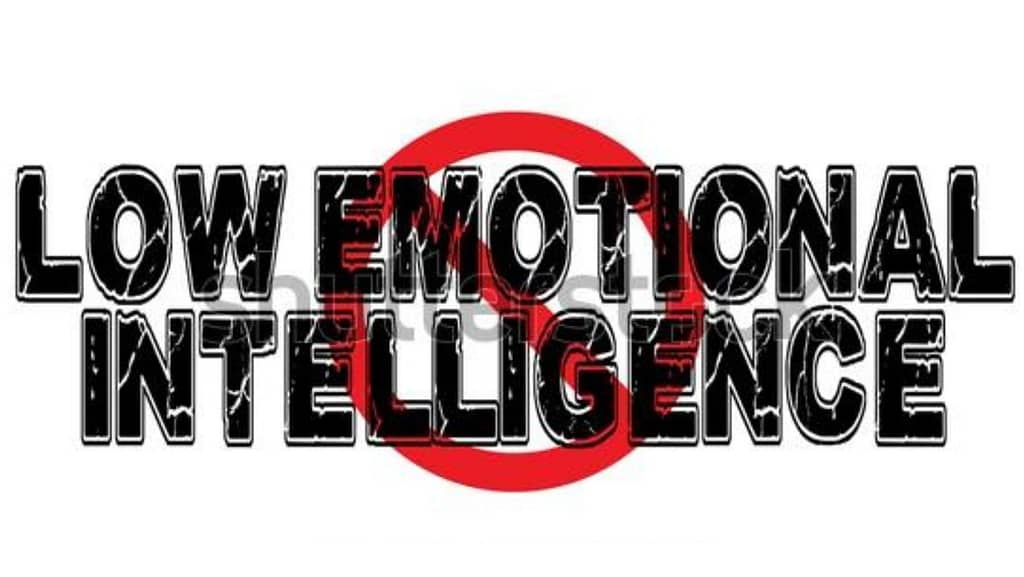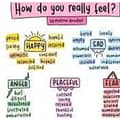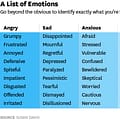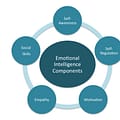Bottling your feelings, frequent emotional outbursts….
Having difficulty in expressing yourself assertively, Holding onto grudges or mistakes, making quick assumptions, getting into frequent conflicts with coworkers, you always have to be right –the list goes on!
If you are indulging in two or more than a couple of such behaviors, you are reading the right post at the right time!

Here are some eye-opening statistics on Emotional Intelligence as one of the most important skills for leaders and managers in the years to come.
-
Research conducted with Fortune 500 CEOs by the Stanford Research Institute International and the Carnegie Melon Foundation, found that ” 75% of long-term job success depends on people skills, while only 25% on technical knowledge.” Source
-
“Talent Smart tested emotional intelligence alongside 33 other important workplace skills and found that EQ was the strongest predictor of performance, explaining 58% of success in all types of jobs.”
-
“75% of careers are derailed for reasons related to emotional competencies, including the inability to handle interpersonal problems; unsatisfactory team leadership during times of difficulty or conflict; or inability to adapt to change or elicit trust (The Center for Creative Leadership).” Source
The purpose of this post is threefold –
1 To enlighten you about the symptoms of low emotional intelligence and raise your awareness as a New Manager.
2 To help you understand some root causes of low EI so that you can understand how it is impacting your behaviour,your health , relationships , workplace and career in the present.
3 To help you know the harmful effects of low EI which can be limiting your success in career and as a manager and Leader in the long run.
If you are interested in knowing more about Low Emotional Intelligence, its cause, and harmful effects in the future, then dive deeper into the post here.
1 YOU BOTTLE YOUR FEELINGS
You have difficulty expressing your feelings.
You avoid talking about your feelings, either because you lack emotional clarity or poor self-awareness.
95% of people think they are self-aware, but only 10–15% are. HBR
You are vague about your feelings and use expressions like “I’m just a little stressed”, “I’m pissed off ” or ”I’m just kind of overwhelmed.”
Do you think it is shameful to feel sadness or fear or anger?
It is a sign that you think it is a weakness or it is wrong to feel emotions like sadness fear or anger.
Or do you blindly follow your emotions?
For example, you feel fearful when you step under a geyser or you feel angry when your boss points out a mistake and asks you to correct it. Believing everything your emotions tell you can be harmful in the long run.
Or do you pretend to be happy all the time?
You mask your emotions like anger, sadness, or frustration and pretend to be happy at all times.
It is an indication that you live in denial of your painful and difficult emotions or you simply do not understand your moods and emotions well.
You must value your emotions and trust the information they give, but you must not be controlled or misled by them.
You must not overvalue them or undervalue them.
Just listen to them and let them work for themselves.
Hiding or denying your emotions will quickly build into stress, tension, or anxiety.
These unaddressed emotions will strain the mind and body leading to an increase in anxiety and depression, thoughts of suicide, or substance abuse.
Use your emotions to guide you to achieve the best possible outcomes.
Bottling or masking your emotions is not authentic or productive.
It is intelligent to use your emotions appropriately in alignment with the situation.
2 .YOU HAVE FREQUENT EMOTIONAL OUTBURSTS.
Do you experience frequent emotional outbursts?
For example, do you lash out reactively without understanding what you are feeling or why you are upset?
Do you get easily offended when others poke fun at you?
Or do you get ignited over the smallest of things and stay upset for hours? Your outbursts are uncontrollable, overblown, and unexpected.
It is because you are unable to understand and control your emotions.
Instead of lashing out uncontrollably, it will be of help if you get in touch with your emotions and regulate them.
You need to be more open-minded and self-confident so that you can differentiate between fun and insults and not get upset easily.
3 YOU ARE UNAWARE OF YOUR TRIGGERS
We all have triggers.
Triggers are anything that might cause a person to recall a traumatic experience they’ve had.
For example, graphic images of violence might be a trigger for some people. Less obvious things, including songs, odors, or even colors, can also be triggers, depending on someone’s experience.
There are some situations or people that set our triggers, causing us to act impulsively.
To overcome this drawback, study your triggers and use this information to stay away from situations and people who cause you to lose self-control and burst out.
4 A DIFFICULTY IN ASSERTING SELF
In situations where you are crossed by others or when someone steps into your boundary, you tend to get aggressive or passive.
Do You have difficulty establishing healthy boundaries and show poor manners, react with emotional outbursts, and get into conflicts easily?
Doing so will earn you more enemies in the workplace and you will face a lot of challenges in getting things done through others.
Maintaining your sense of calm, remaining balanced, exhibiting empathy and asserting yourself, filtering your emotions, and responding appropriately are some tactful ways to avoid getting into conflicts, and positively deal with negative people without making enemies.
5 YOU MAKE QUICK ASSUMPTIONS
Do you make quick assumptions, and gather enough evidence to support it, Or do you jump to a conclusion quickly?
Do you refuse to look at any other alternate or contrary opinion or evidence?
To counter this habit, one effective way can be to let your initial thoughts develop over time because our initial responses are emotion-driven.
Letting your thoughts rest and carefully thinking over things, their consequences, and weighing the pros and cons, will help you grow into a thoughtful leader.
Taking opinions from others will endear you to your team and help you build a better-engaged team that will feel inclusive and psychologically safe.
6 YOU HOLD GRUDGES
If you are a person who holds grudges then you must know that holding on to grudges triggers more negative emotions which are a stressful response.
Continual stress weakens the body by causing diseases like high blood pressure and heart disease.
Letting go of grudges keeps you healthy mentally, emotionally and physically.
Be compassionate towards others and Practise forgiveness and letting go to be more peaceful and healthy.
7 YOU KEEP LIVING WITH YOUR MISTAKES
You keep living with your mistakes.
Living or dwelling on mistakes triggers negative thoughts making you feel unconfident, anxious, and shy.
On the other hand, completely forgetting them increases your chances of repeating them.
The key to success lies in transforming your failures into success by learning from them and improving yourself so that you build up the habit of rising every time you fall.
8 YOU BELIEVE YOU ALWAYS HAVE TO BE ‘RIGHT’
Do you frequently argue with or get into disputes with Friends, family, co-workers, and even random strangers?
And worse still, do you find yourself arguing to the point of death, and turning a deaf ear to what others have to say?
You believe that you have to win at all costs.
This unhealthy habit will alienate people from you, they will no longer trust you and avoid talking to you.
It is harmful to your career growth in the long run because as a manager or leader, your job is to get work done through people and develop people.
To counter this habit, listen to the viewpoint of the other person.
Ask them to come up with evidence to back their arguments or prove their point.
Ponder over their evidence and look for the truth.
Learn to accept others with their perspective even if you disagree with them.
9.YOU LACK EMPATHY
If you have a habit of making fun of others’ feelings or making remarks that are insulting or pull others down, then it is a sign that you lack empathy.
It is because you are unable to anticipate others’ needs or accept the uniqueness of others.
Empathy is a skill that is very critical for leadership success.
To be a great leader it is important to understand how others feel.
In a Research by HBS -Harvard Business School, it was found that Leaders with empathy perform over 40% higher in employee engagement, decision-making, and coaching.
Practicing to pause before making a remark and thinking of how relevant or appropriate your remark is, how it will affect the other person, and how the other person might respond to it will win you many people’s respect and go a long way to building trust in you as a leader and healthy relationships in the workplace.
10 YOU HAVE VERY FEW FRIENDS AND STRUGGLE WITH RELATIONSHIPS
Do you have very few friends?
Do you have difficulty forming close relationships with others in life or the workplace?
Do you have doubts about others, or do you place your own needs above those of others always?
Do you frequently get into conflicts with everyone in the workplace?
It is an indication that you have a superficial relationship with everyone.
With superficial relationships, there will be no deeper connection and trust, which will make it hard for you to work with others and lead them.
Connecting with your co-workers at a deeper emotional level and putting in all the hard work will bring more satisfaction, increase productivity and help you grow a well-engaged team.
In addition, you will also have a sense of belongingness with your organization and you will find it more joyful to go to work.
For more success in life and career, you must develop Your emotional intelligence skill which will help you to understand others, be more empathetic, build trust with your team, know yourself and others better and manage your own difficult emotions and have more effective communication.
To grow in this area, share your emotions with others.
Be more caring, and understand what others are feeling.
be more compassionate to them, and provide emotional support to them when they need it.
11 YOU OFTEN FIND THAT PEOPLE DO NOT UNDERSTAND YOU .
Do you often find that people do not understand you?
Or do you feel that you are often misunderstood?
It is a sign that you are not able to communicate your ideas clearly or you want to communicate on your terms without keeping others’ perspectives in mind while communicating.
This can be a reason why people do not connect with your communication.
Ask yourself what you can do differently, and adjust your approach.
Practice communicating your ideas as clearly as possible.
Re-Communicate your message in a way others can understand.
12 YOU BLAME OTHERS FREQUENTLY
” I had no choice for what I did then! People don’t understand my situation ’’
Do you find yourself telling this often?
Do you blame others when things go wrong or when an assignment fails?
Do you find yourself often blaming other people’s actions for the cause of your bad feelings or believe that others are responsible for making you feel bad?
If you are nodding yes to any of the above statements, you are having low emotional intelligence.
Blaming others means you are not holding yourself accountable and you are depriving yourself of the chance to grow.
Blaming others for things going wrong or how you feel will only hold you back.
Emotions can misguide you and lead you into more problems.
Taking responsibility for your own emotions will give you more insight into the cause of your issues and help you understand a difficult truth about yourself.
You will become more productive with time.
Remember no one can make you feel bad if you don’t want to.
13 YOU ARE BAD AT READING PEOPLE
As a Manager or Leader, the inability to read people is a strong sign that you lack emotional intelligence.
Reading people is a tremendously important skill for Managers and Leaders to succeed in their roles.
You must develop the ability to see beyond what they are saying.
It is important to recognize the patterns of people’s thoughts, words, and behavior.
You will be able to predict how people are likely to respond to new ideas and changes in the organization.
This skill will enable you to find helpful strategies to break them time and again.
One thing you can do to develop this skill is to get in touch with your own emotions as often as you can.
This will help you in understanding others and read them well.
14 YOU HAVE POOR COPING SKILLS
An indicator of poor coping skills is -You are unable to deal with emotionally charged situations.
It is because you find it difficult to comprehend strong emotions in yourself or others. Very often you hide your own emotions.
You often find yourself walking away from a heavily charged situation because you do not want to deal with the fallout.
15 YOU TURN MOST OF THE CONVERSATIONS TOWARDS YOURSELF
While conversing with others, you want to be the star of all conversations and tend to dominate the conversations.
You always try to appear to be better than everyone else.
Your accomplishments are better than those of others.
Do you shift the conversation back to yourself?
When a colleague says he has had a bad experience with an employee, you immediately say that you have had it worse.
Eg,-Someone says they had to quit their job because of a bad boss, you tend to say that you too had to quit once and you had a tough time for 6 months , finding a new one and you go on and on and on about a topic once you start.
Having said that , a question may arise in your mind ,as to what are the causes of low emotional intelligence. Let us explore the causes of low emotional intelligence .
7 CAUSES OF LOW EMOTIONAL INTELLIGENCE
Low Emotional Intelligence can be attributed to various causes. Some of them can be.
1 WRONG PARENTING STYLES AND UPBRINGING
Emotional intelligence skills are shaped from the early days. People grow up into adults with low emotional intelligence because of the wrong parenting styles and bad treatment from people around them -Eg Teachers, Relatives, Caregivers etc.
Some of the reasons are
-
Negligence of their needs
-
Lack of love and cold treatment from parents and caregivers. Inconsistent support and warmth from them.
-
Demonstration of poor regulation skills by people around them. If people around you handle their emotions poorly, as children you tend to copy and emulate them.
-
Discouraging them to talk about their feelings and depriving them of the scope to express their feelings in appropriate ways.
-
Being punished for showing feelings.
-
Overly harsh discipline or inconsistent discipline
-
Over controlling and over protectiveness.
2 .POOR MENTAL HEALTH
Poor mental health like depression or borderline personality disorder makes it difficult to identify and manage emotions.
Social anxiety is also caused by Low EI.
It can lead a person to avoid social situations and increase feelings of depression and pessimism.
Some other reasons can be substance abuse, addictions, and alcohol dependence.
They limit your brain’s ability to interpret and manage emotions and impulses.
If you have trouble understanding how other people feel, you could begin to find interactions stressful and fear saying something that gets people mad at you.
3 POOR KNOWLEDGE OF EMOTIONS
In our school curriculum, more importance is placed on IQ, than EQ.
As children, we are not taught to identify and understand our emotions, so that we can regulate them effectively.
Our society also places more importance on logic, than emotions.
Expressing emotions is considered to be a weakness and we are encouraged to push them aside.
Poor knowledge of emotions often finds you in situations where the emotions get the better of you.
When emotions overpower us, we lose all sense of logic.
It is important to practice self-awareness to understand what causes them so that you can apply logic and reasoning to your emotions and treat them as any other natural phenomenon so that you can manage them more productively.
4 .POOR INTRAPERSONAL INTELLIGENCE.
Intrapersonal intelligence is the ability to dive deeper into your inner self to understand one’s self including your thoughts, fears, and motivations, and the ability to then utilize this understanding to make decisions and communicate.
People who look deeply into themselves possess higher emotional intelligence.
They can also look deeply into others’ thoughts, emotions, fears, hopes, aspirations, and desires because, at the basic level, all humans are the same.
5.NOT PRACTISING CONSISTENTLY
Emotional Intelligence is a skill that needs to be developed through regular practice.
Once you understand your triggers and those of others around you, you need to put your knowledge into practice to see good results.
Notice the small changes inside you, the change in your moods and energy levels. Know the cause of those shifts and manage them.
Be aware of the shifts in others by paying attention to the shifts in their tone, body language, facial expressions, and energy levels.
Empathize with them.
Connect with them at a deeper level by knowing their motives and concerns and being compassionate towards them.
Consistency will help you increase your EI over time.
6.EXCESSIVE SELF-CENTEREDNESS OR NARCISSISM
Most adults carry on with them the self-centered and narcissistic mentality of their childhood.
They do not realize that others also have thoughts, emotions, and minds of their own.
They always have this selfish and winning above-others mentality which makes them less empathetic, and generous towards others.
They are less concerned about the feelings and needs of others around them.
Because of this attitude, they have very few friends and poor relationships with everyone.
7.ALEXITHYMIA
Alexithymia is a subclinical phenomenon involving a lack of emotional awareness or, more specifically, difficulty in identifying and describing feelings and in distinguishing feelings from the bodily sensations of emotional arousal (Nemiah et al., 1976).
Some Symptoms of Alexithymia are :
-
A lack of impulse control.
-
Violent or disruptive outbursts.
-
Indifference towards other people.
-
Difficulties with articulating emotions.
-
Difficulties with naming different kinds of emotions.
-
Struggling to identify emotions expressed by others.
-
Heightened sensitivity to sights, sounds, or physical touch.
Alexithymia can be due to reasons like brain injury in the past, a stroke, depression, autism, or childhood trauma.
People who suffer from alexithymia have difficulty recognizing and expressing their emotions.
They might not be able to empathize with others.
They attach more importance to logic and concrete facts and have little regard for imaginative or feeling-based thinking.
HOW LOW EMOTIONAL INTELLIGENCE CAN BE HARMFUL FOR YOU.
Low EI can cause a variety of problems in any area of your mental health , relationships , work place ,career or sabotage your success as a manager /leader .
Some of the most common problems include:
-
Experience a Wide Range of Negative Emotions – People who have low Emotional Intelligence tend to experience and be controlled by negative emotions like anger, fear, depression, frustration, shame, guilt anxiety or worry extensively.
-
Feelings of Inadequacy – Emotions are shaped by our perceptions.
Those who experience negative emotions frequently have negative perceptions.
They feel inadequate, powerless, weak, under-appreciated or undervalued.
For example they blame external situations for their failures.
-
Lack of Emotional Regulations and management – People with low EI are unable to read their own emotions well.
Because of this, they are not able to control their emotions and demonstrate frequent outbursts, and impulsiveness.
-
Ineffective Communication -Individuals with Low EI skills tend to be self-centered, are less open-minded, and are less empathetic towards others.
Due to this, they have difficulty in expressing their ideas or appreciating ideas from others.
They frequently have misunderstandings with those around them.
Workers who have managers with high EQ scores are four times less likely to quit than those with managers who have low EQ.-(LinkedIn)
-
Poor Decision-making – People who have Low I have poor decision-making ability which makes them inactive. They are often confused and have difficulty finding the right direction.
They cannot guide the team in the right direction during projects and assignments. This lowers the productivity and performance of the team.
-
Emotional intelligence has a 58% influence on job performance.(Vantage Circle)Low EQ is responsible for low performance
-
Lack of trust.– Individuals who possess low EI are not trusted by their Seniors and team members.
They become confident as a result of this and start distrusting their abilities and distrust those around them.
This makes it all the more challenging to work efficiently.
They have poor credibility and earn a bad reputation for themselves as well as the company, which makes it difficult for stakeholders and clients to trust the company and do business with them.
“The reason for losing customers and clients are 70% EI-related (e.g., didn’t like that company’s customer service) (Forum Corporation on Manufacturing and Service Companies, 1989 – 1995).” Source
CONCLUSION
I hope you have understood by now What the symptoms ,causes and effects of low emotional intelligence are and how they affect your workplace,relationships ,health and career and sabotage your success as a Manager or Leader.
I believe that you are no longer the same person that you used to be.
In a survey by Career builder, it was found that High EQ employees are favoured over high IQ employees for promotion 75% of the time.
If you want to have a successful and fulfilling career as a Manager /Leader then you must invest your time in practising self-awareness and self-regulation.
Do you want to Master your Emotional Intelligence and Deal with Difficult Emotions Mindfully? Get the FREE GUIDE below .

I would like to end the post by asking you, what is one thing that you would like to change about yourself today? What do you need help with?
Please share your thoughts below .
Babita Sharma
Leadership Coach
www.leadwithpassion.co.in
P.S –Please share the post and help someone today !
SUGGESTED RESOURCES :
18 GREAT REASONS WHY YOU MUST DEVELOP YOUR EMOTIONAL INTELLIGENCE
23 BEST PRACTICES THAT WILL BOOST YOUR EMOTIONAL INTELLIGENCE







